Key takeaways:
- Identifying sleep issues, such as late-night screen time and inconsistent schedules, is essential for improving sleep quality.
- Creating a sleep-friendly environment, including a clutter-free space and comfortable bedding, significantly enhances restfulness.
- Establishing a consistent bedtime routine and incorporating relaxation techniques can lead to improved overall sleep patterns and emotional well-being.
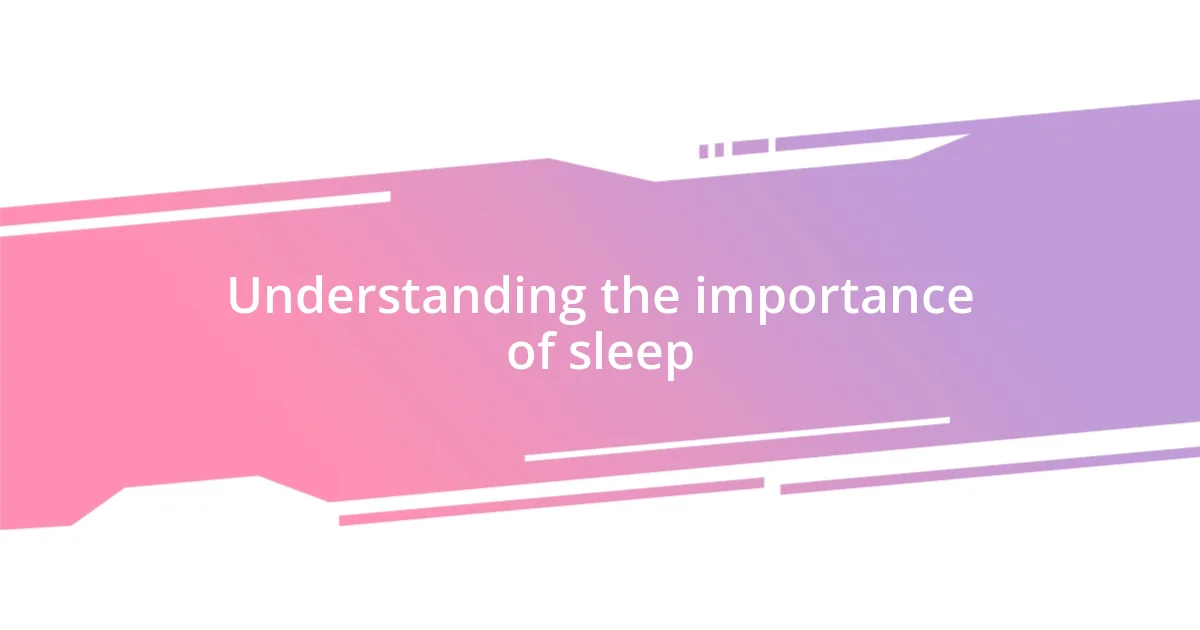
Understanding the importance of sleep
Sleep is often overlooked, yet it’s one of the most crucial components of our overall well-being. I remember a period in my life when I consistently sacrificed sleep for work and social activities, only to find myself exhausted and irritable. Have you ever felt that overwhelming fatigue creeping in? Sleep is our body’s way of healing and rejuvenating itself; it’s when we recharge physically and mentally.
What’s fascinating is that during sleep, our brains undergo processes that enhance memory and learning. I’ve noticed that on nights when I get enough rest, I wake up clear-headed, ready to tackle the day with creativity and focus. Conversely, when I skimp on sleep, it’s like trying to function on low battery power—everything feels harder, and decisions become clouded. Isn’t it amazing how something as simple as sleep can have such a profound impact on our daily lives?
Additionally, the relationship between sleep and emotional well-being is undeniable. I’ve found that a good night’s sleep not only boosts my mood but also helps me process my emotions better. Think about those days when you’ve had just a few restless hours; don’t you often feel more anxious and less capable of handling stress? Understanding the importance of sleep means recognizing its vital role in maintaining both our mental and physical health.
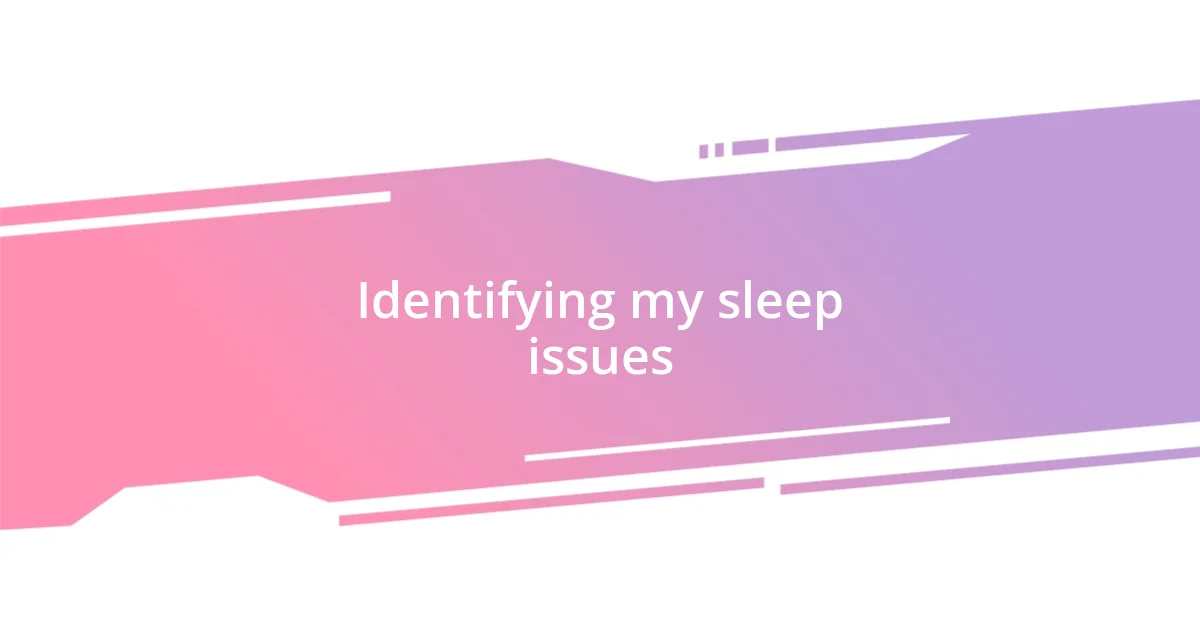
Identifying my sleep issues
Identifying my sleep issues was crucial in my journey to enhance my restfulness. At first, I didn’t realize that my late-night screen time and erratic sleep schedule were the culprits behind my grogginess. It hit me one evening when I struggled to stay awake during a simple dinner, and I felt profoundly frustrated with myself. How could something so essential to my well-being be slipping through my fingers?
To better understand my sleep problems, I created a list of patterns and behaviors that seemed off, which helped me identify key issues:
- Technology addiction: Excessive screen time before bed kept my brain overstimulated.
- Inconsistent bedtime: I often went to bed at different times, which disrupted my body’s natural rhythm.
- Caffeine consumption: I realized I was consuming coffee too late in the day, impacting my ability to wind down.
- Sleep environment: My bedroom was cluttered and noisy, making it hard to relax.
- Stress: I often went to bed with racing thoughts about work and personal challenges.
Reflecting on these points helped me see how interconnected each factor was. I felt relieved to have a clearer idea of what needed adjustment. It was a turning point that marked the beginning of my proactive approach to better sleep.
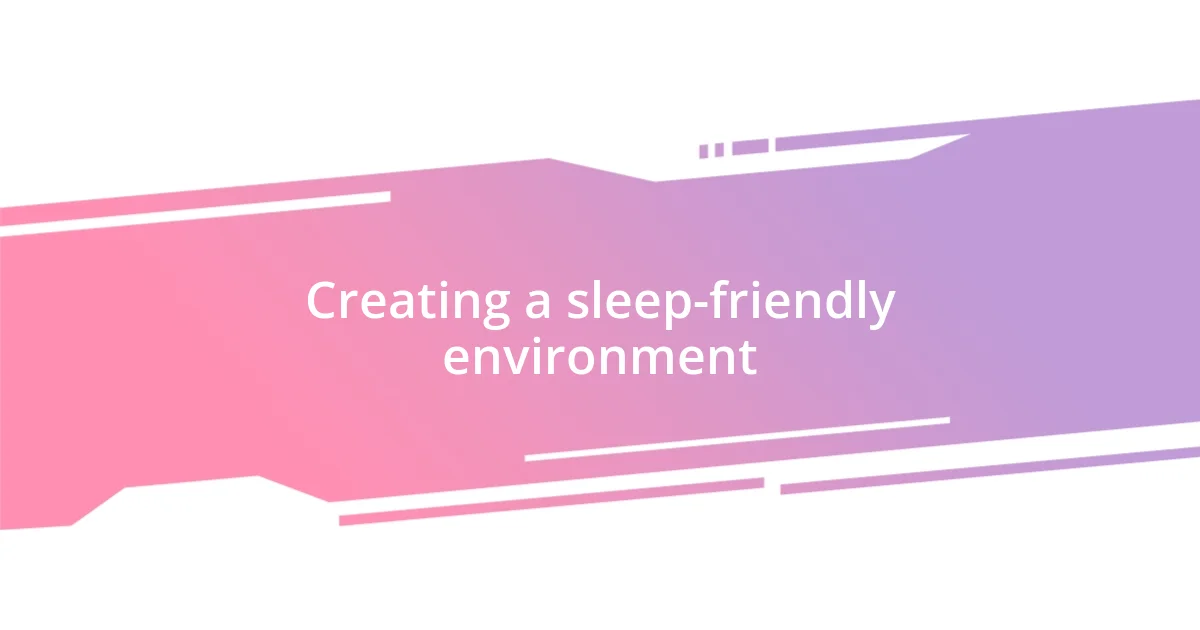
Creating a sleep-friendly environment
Creating a sleep-friendly environment is an essential step towards improving overall sleep quality. I still remember transforming my bedroom from a cluttered mess into a tranquil sanctuary. It seems simple, but I discovered that elements like soft lighting and calming colors significantly impacted how restful my space felt. Have you ever entered a room and felt an immediate sense of calm? That atmosphere makes all the difference when it’s time to unwind.
Another aspect I realized was the importance of keeping my sleeping area cool and quiet. I invested in blackout curtains to block out the morning sunlight and a white noise machine to mask any outside noise. On the nights I forget to turn it on, I often find myself tossing and turning, unable to settle. I can’t emphasize enough how vital it is to eliminate distractions—create a space that’s solely dedicated to rest. Can you feel the difference when you walk into a room designed for sleep versus one riddled with interruptions?
Finally, I made sure to choose comfortable bedding. It’s astonishing how a good mattress and pillows can enhance your sleep experience. In the past, I used old pillows that provided little support, and I consistently woke up with neck pain. Now, I feel cradled in comfort, which encourages longer, uninterrupted sleep. It’s the little things that can flip the script when it comes to quality rest, don’t you think?
| Factor | Impact on Sleep |
|---|---|
| Clutter-free space | Reduces anxiety and promotes relaxation |
| Temperature control | Helps maintain comfort throughout the night |
| Quality bedding | Enhances comfort and reduces discomfort |
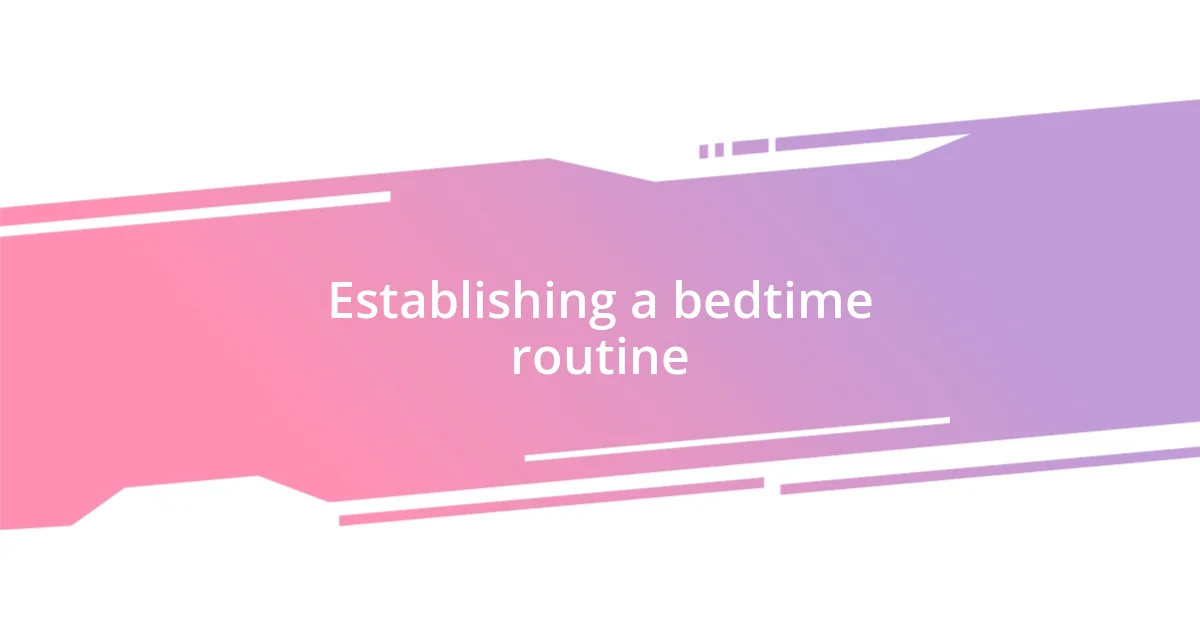
Establishing a bedtime routine
Establishing a bedtime routine was a game-changer for me. Initially, my nights were a chaotic mix of screens, stress, and restless tossing. Once I began to carve out a pre-sleep ritual, I noticed a remarkable shift in my sleep pattern. Simple activities, like reading a few pages of a book or sipping on herbal tea, transitioned my mind from the day’s hustle to a more relaxed state. Have you experienced the soothing effect of disconnecting from technology? I found that just a small commitment to winding down made all the difference.
In my quest for better sleep, I learned the value of consistency. Keeping the same bedtime every night not only helped reset my internal clock, but it also created a sense of stability. At first, I struggled to resist the glow of my phone, but over time, I realized that my body craved this routine. I felt a sense of accomplishment waking up refreshed, knowing that I had prioritized my well-being. How satisfying is it to wake up feeling energized instead of dreading the day ahead?
One pivotal change I made was incorporating relaxation techniques before bed. By practicing deep breathing or gentle stretches, I noticed my mind began to slow down, freeing me from the day’s worries. I often felt an emotional weight lifting as I entered this introspective space. Do you remember a time when you felt completely at peace just before falling asleep? It’s those moments of tranquility that foster a restorative night’s rest, inviting a deeper connection with our well-being.

Incorporating relaxation techniques
Integrating relaxation techniques into my bedtime routine was a revelation. Each night, I set aside a few minutes for mindfulness meditation. I remember the first time I quietly paced my breath, feeling the tension in my shoulders slip away. Isn’t it fascinating how just five minutes of stillness can shift our perspective and calm our minds?
I also discovered the power of gentle yoga stretches. There’s something incredibly soothing about elongating my muscles after a long day. I often find myself reflecting on how these stretches, paired with soft music, create an almost sacred space where worries fade into the background. Have you ever felt that blissful moment where your body and mind finally converge in harmony?
Finally, I’ve experimented with aromatherapy as a relaxation technique. Spraying a calming lavender mist around my bedroom has become a ritual I look forward to every night. The scent creates an inviting atmosphere that makes me want to sink into my pillows. I love how an aroma can evoke feelings—do you have a scent that brings you comfort and relaxation? Embracing these techniques has not only improved my sleep quality but has deepened my nightly routine into a cherished ritual.
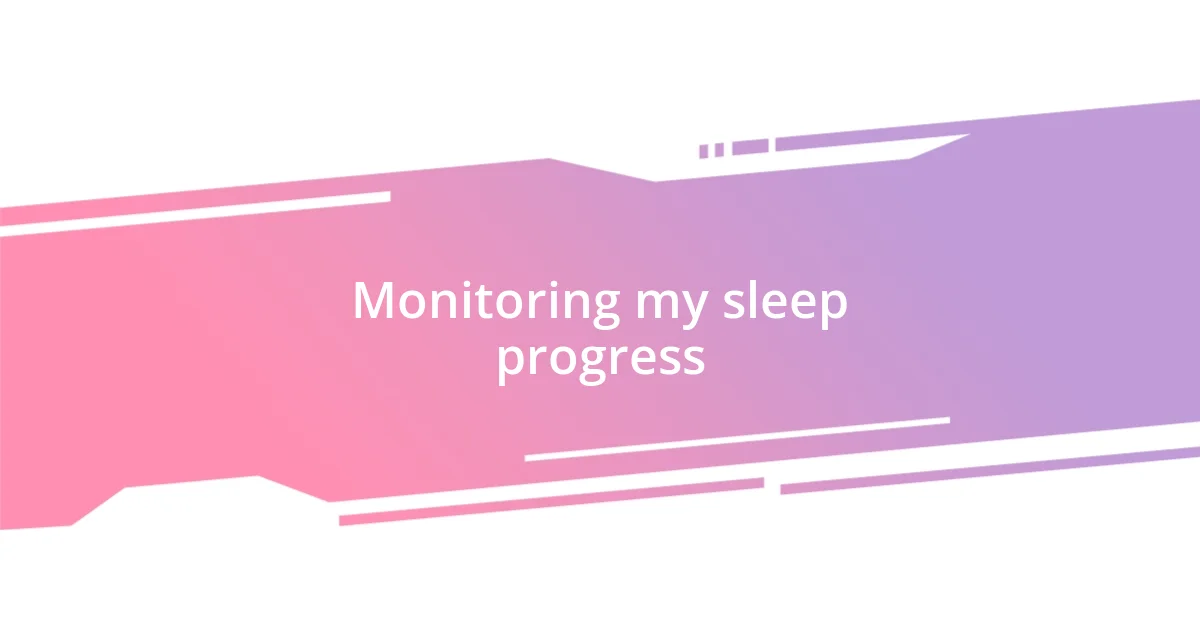
Monitoring my sleep progress
Monitoring my sleep progress was an enlightening experience. I started using a sleep tracking app to gain insights into my sleep patterns. The first time I reviewed my sleep data, I was surprised to see how often I woke during the night. Have you ever thought you slept well, only to find out your rest was fragmented? That realization prompted me to become more conscious about my habits.
As I collected data night after night, I noticed trends linked to my daily activities. I began correlating my sleep quality with factors like caffeine intake and screen time before bed. There were evenings when a late coffee seemed harmless, but the tracking showed a clear impact on my rest. Isn’t it curious how our choices during the day ripple into the night? This connection deepened my commitment to making healthier choices.
Over time, I also learned to appreciate the quiet reflection that the sleep data provided. Each morning became a moment of introspection; I would assess what worked and what didn’t. The surprise of a great night’s sleep would inspire me to replicate the conditions. I found that crafting a narrative from my sleep data turned an abstract concept into a tangible goal. Have you ever felt empowered by understanding your body’s signals? With each passing week, I felt more in tune with my needs, transforming my journey to better sleep into an adventure of self-discovery.
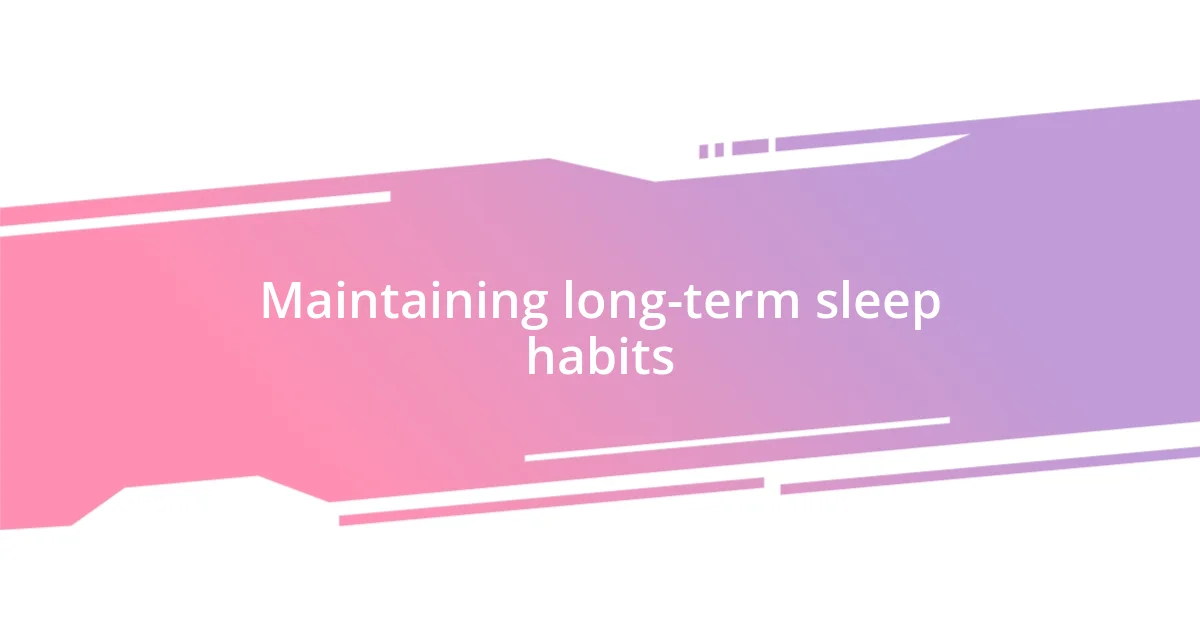
Maintaining long-term sleep habits
Maintaining long-term sleep habits requires consistency and a willingness to adapt. I found that sticking to a regular sleep schedule was one of the best ways to ensure quality rest. Initially, I struggled with irregular hours, often staying up late and tossing between alarm settings. But when I began waking up and going to bed at the same time every day, I noticed a significant improvement in my energy levels. Have you ever experienced that refreshing feeling of waking up at the same time every day and feeling truly rested?
Through trial and error, I also learned the importance of creating an optimal sleep environment. I invested in blackout curtains to block out disruptive light and adjusted the thermostat to maintain a cool, comfortable temperature. It might sound simple, but I remember the first night I truly embraced this environment—a peaceful calm swept over me as I settled in. The difference was remarkable! What adjustments have you made to your sleeping space that transformed your rest?
Lastly, I’ve realized that flexibility is key. Life can throw unexpected challenges at us, and occasionally, my routine gets disrupted. On those nights I find it hard to wind down, I’ve learned to be patient with myself instead of stressing over my sleep. I remind myself that it’s about the overall pattern, not just a single night. Have you ever felt that small moment of anxiety about breaking a good streak? Embracing this mindset shift has allowed me to cultivate long-term habits with less pressure, making my journey toward better sleep not just manageable but enjoyable.














